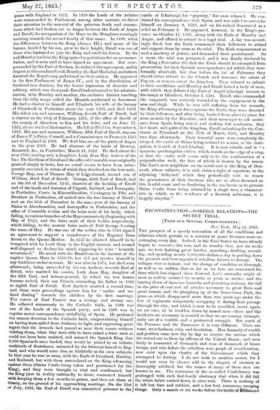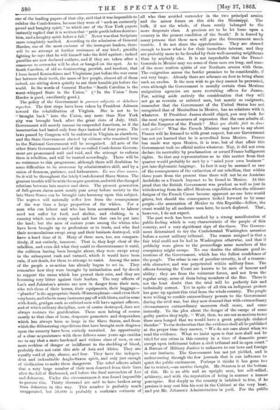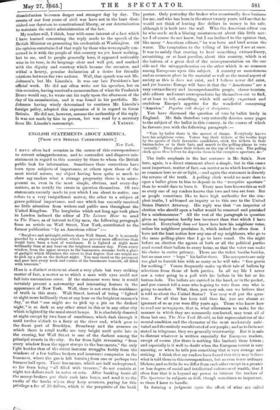RECONSTRUCTION—FOREIGN RELATIONS—THE SECRET TRIAL.
[FROM OUR SPECIAL CORRESPONDENT.]
Nor York, May 12, 1865. Time prospect of a speedy restoration of all the conditions and relations which pertain to a country at peace becomes more en- couraging every day. Indeed, in the Free States we have already begun to remember the war, and to wonder that, not six weeks ago, we were fighting great battles, marching, drafting, recruit- ing, and spending nearly 3,000,000 dollars a day in putting down the greatest and best-organized rebellion known to history. The collapse was so instant, and the change of condition so thorough, as well as so sudden, that as far as we here are concerned the time which has elapsed since General Lee's surrender might al- most as well be counted by months or years as weeks ; and the tearing down of immense barracks and recruiting stations, the fall in the price of coal and all articles necessary to great fleets and great armies, and the ploughing up of the down-town Park, the grass on which disappeared more than two years ago under the feet of regiments temporarily occupying it during their passage through the city, and which is now to be resodded, never again, we are sure, to be trodden down by armed men—these and like incidents are necessary to remind us that we are coming triumph- antly out of a terrible and a protracted struggle. But south of the Potomac and the Tennessee it is very different. There are want, wretchedness, ruin, and desolation. Men formerly of wealth end position come now day by day to receive the rations which are served out to them by officers of the United States ; and men lately in command of thousands and tens of thousands of brave troops, and who before the rebellion were people of consideration,
now exist upon the charity of the Government which they attempted to destroy. I do not wish to mention names, for I would not even by chance add to the chagrin of enemies so thoroughly subdued, but the names of many of these men are known to me. The resistance of the so-called Confederacy was prolonged with such fool-hardy obstinacy that when it did fall the whole fabric rushed down in utter ruin. There is nothing of it left but dust and rubbish, and a few foul, venomous, creeping things. Only a month or six weeks before the battle of Richmond one of the leading papers of that city, said that it was impossible to subdue the Confederates, because they were of "such an eminently proud and haughty spirit," to which one of the New York papers instantly replied that it is written that "pride goeth before destruc- tion, and a haughty spirit before a fall." Never was that Scripture more completely verified. According to the admission of General Hardee, one of the most eminent of the insurgent leaders, there will be no attempt at further resistauce of any kind ; guerilla fighting he says that he will himself take the field against ; indeed guerillas are now declared outlaws, and if they are taken after a summons to surrender will be shot or hanged on the spot. As to South Carolina, of old so domineering, peevish, and insolent, that I have heard Kentuckians and Virginians just before the war curse her between their teeth, the mass of her people, almost all of them indeed, are sitting down quietly to eat their humble pie before the world. In the words of General Hardee " South Carolina is the worst-whipped State in the Union." (" In the Union" from Hardee is good, excellently good.)
The policy of the Government is parcere subjectis et debellare superbos. The first steps have been taken by President Johnson toward the rehabilitation of Virginia. She is not to be " brought back " into the Union, any more than New York city was brought back after the great riots of July, 1863. Government will merely resume its suspended functions, as if the insurrection had lasted only four days instead of four years. The laws passed by Congress will be enforced in Virginia as elsewhere, and the State Government elected by citizens who remained true to the National Government will be recognized. All acts of the other State Government and of the so-called Confederate Govern- ment are pronounced null and void, and the attempt to enforce them is rebellion, and will be treated accordingly. There will be no resistance to this programme, although there will doubtless be some difficulties to be overcome by administrative skill, and by a union of firmness, patience, and forbearance. Ex use disce omnes. So it will be throughout the lately Confederated Slave States. The greatest trouble will be with the negro question, and with the changed relations between late master and slave. The present generation of full-grown slaves must nearly pass away before society in the late Slave States can be brought into harmony upon this subject. The neg,roos will naturally suffer less from the consequences of the war than a large proportion of the whites. For a man who can labour and who has been accustomed to labour need not suffer for food, and shelter, and clothing, in a country which needs every spade and hoe that can be put into the land ; but the men of mature years among the whites who have been brought up to professions or to trade, and who find their accumulations swept away and their business destroyed, will have a hard time of it. Many of these men, too, are compara- tively, if not entirely, innocent. That is, they kept clear of the rebellion, and even did what they could to discountenance it until, the collision having been brought about, they were swept away in the subsequent rush and turmoil, which it would have been ruin, if not death, for them to attempt to resist. Among the mass of the people a re-action has already begun to set in. They remember how they were brought by intimidation and by deceit to support the cause which has proved their ruin, and they are becoming very bitter against their leaders. The very officers of Lee's and Johnston's armies are now in danger from their men, who rob them of their horses, their equipments, their baggage- " plunder" is the appropriate South-Western phrase—and even their very boots, and who in many instances pay off with blows, and in some with death, grudges such as enlisted men will have against officers, and of which military discipline, now of course destroyed, does not always restrain the gratification. These men belong of course mostly to that class of loose, desperate gamesters and desperadoes; which has always been so large in the Slave States, and from which the filibustering expeditions that have brought such disgrace upon the country have been entirely recruited_ An opportunity of a close acquaintance with these fellows some years ago enables me to say that a more hardened and vicious class of men, or one more reckless of danger or indifferent to the shedding of blood, probably does not exist this aide of Asia and Africa. They are equally void of pity, shame, and fear. They have the indepen- dent and indomitable Anglo-Saxon spirit, and only just enough of civilization to make them dangerous. The rebel officers admit that a very large number of their men deserted from their lines after the fall of Richmond, and before the final surrenders of Lee and Johnston. Under the circumstances it was found impossible to prevent this. Thirty thousand are said to have broken away 'from Johnston in this way. This number is probably much exaggerated, but 50,000 is probably a moderate estimate of
all who thus avoided surrender in the two principal armies and the minor forces on this side the Mississippi. The bulk, if not the whole, of these surely belonged to the more desperate class. A precious set to be let loose upon a country in the present condition of the South ! It is feared by many persons that these men will give the Government much trouble. I do not share the apprehension. They are shrewd enough to know what is for their immediate interest, and they are probably more to be dreaded by their well-meaning neighbours than by anybody else. It is not improbable that the French Generals in Mexico may see some of these men ere long, and some of the more restless spirits of our Northern armies with them. The emigration across the border promises to be considerable, if not very large. Already there are schemes on foot to bring about such an exodus. It the men wish to go they cannot be prevented, even although the Government is morally certain than Mexican emigration agencies are mere recruiting offices for Juarez. For, setting aside entirely the consideration that they will not go as recruits or enlisted men, but merely as emigrants, remember that the Government of the United States has not recognized that of Maximilian in Mexico, has no relations with it whatever. If President Jaurez should object, you may look for the moat vigorous measures of repression that the case admits of_ And the Emperor of the French ? Mais que diable fait IL dans cette galere ? What the French Minister may have to say about France will be listened to with great respect, but our Government has not yet learned that he is accredited from Mexico. France has made war upon Mexico, it is true, but of that affair this Government took no official notice whatever. Nay, it did not even declare its neutrality by proclamation or award France belligerent rights. So that any representations as to this matter from that quarter would probably be met by a "mind your own business" put into diplomatic language. In fact it may be assumed as one of the consequences of the extinction of our rebellion, that within three years from the present time there will not be an Austrian Archduke or a French bayonet to be found in Mexico. At this proof that the British Government was prudent as well as just in withdrawing from the allied Mexican expedition when the ultimate designs of the French Caesar became apparent no one here would grieve, but should the consequence looked forward to by some people—the annexation of Mexico to this Republic—follow, the event would by all moderate men here, be much deplored. That, however, I do not expect.
The past week has been marked by a strong manifestation of public feeling which is very characteristic of the people of this country, and a very significant sign of the times. The Govern- ment determined to try the Confederated Washington assassins before a secret military tribunal. The reason assigned is that a fair trial could not be had in Washington otherwise, and that if publicity were given to the proceedings some members of the conspiracy might escape. No one doubts the ultimate good in- tentions of the Government, which has the fullest confidence of the people. The crime is one of peculiar atrocity, is of a treason- able character, and was perpetrated within military lines. The officers forming the Court are known to be men of honour and ability ; they are from the volunteer forces, and not from the regular army, some of them being members of the Bar. There is not the least doubt that the trial will be perfectly fair and technically correct. Yet in spite of all this an indignant protest has gone up against this trial from the whole country. The people were willing to confide extraordinary powers to the Government during the civil war, but they now demand that with extraordinary circumstances extraordinary measures shall cease, and cease instantly. To the plea about the danger of the escape of some guilty parties they reply, " Wait, then, we are not so anxious to see these men hanged that we would have a great principle violated therefor." To the declaration that the evidence shall all be published at the proper time they answer, " We do not care about wheniwe read the evidence. What we insist upon is that men shall not be tried for any crime in this country in a time of domestic peace except upon indictment before a civil tribunal and in.open court." A Bureau of Military Justice is unknown to our laws and foreign to our instincts. The Government has not yet yielded, and is endeavouring through the few journals that it can influence to quiet the public excitement. Perhaps it thinks it has gone too far to retract,—an unwise thought. Mr. Stanton is at the bottom of this. lie is an able and an upright man, but self-willed, arbitrary, and with the reputation of being in manner a human porcupine. But deeply as the country is indebted to him, if he persists it may cost him his seat in the Cabinet at the very least, and put Mr. Johnson's Administration in peril. For the public
dissatisfaction becomes deeper and stronger day by day. The events of our four years of civil war have not in the least dimi- nished our devoleon to constitutional liberty, or our determination to maintain the strict administration of the law.
My readers will, I think, hear with some interest of a fact which I have learned concerning the reply made to the speech of the ,British Minister on presenting his credentials at Washington. Of the opinion entertained of that reply by those who were equally con- cerned in it with the people of this country we yet know nothing, but to me, and to people generally here, it appeared noticeably wise in its tone, in its language clear and well put, and marked with the dignity and courtesy which became the occasion, and withal a hearty, genuine declaration of a desire for friendly relations between the two nations. Well, that speech was not Mr. Johnson's, but Mr. Lincoln's. It was our late President's last official work. He did not often write out his speeches, but on this occasion, having received a memorandum of what Sir Frederick Bruce would say, he wrote out his reply upon the afternoon of the day of his assassination, and it was found in his portfolio. Mr. Johnson having wisely determined to continue Mr. Lincoln's foreign policy, adopted this expression of it in regard to Great Britain. He did not, however, assume the authorship of the reply. It was not made by him in person, but was read by a secretary




































 Previous page
Previous page